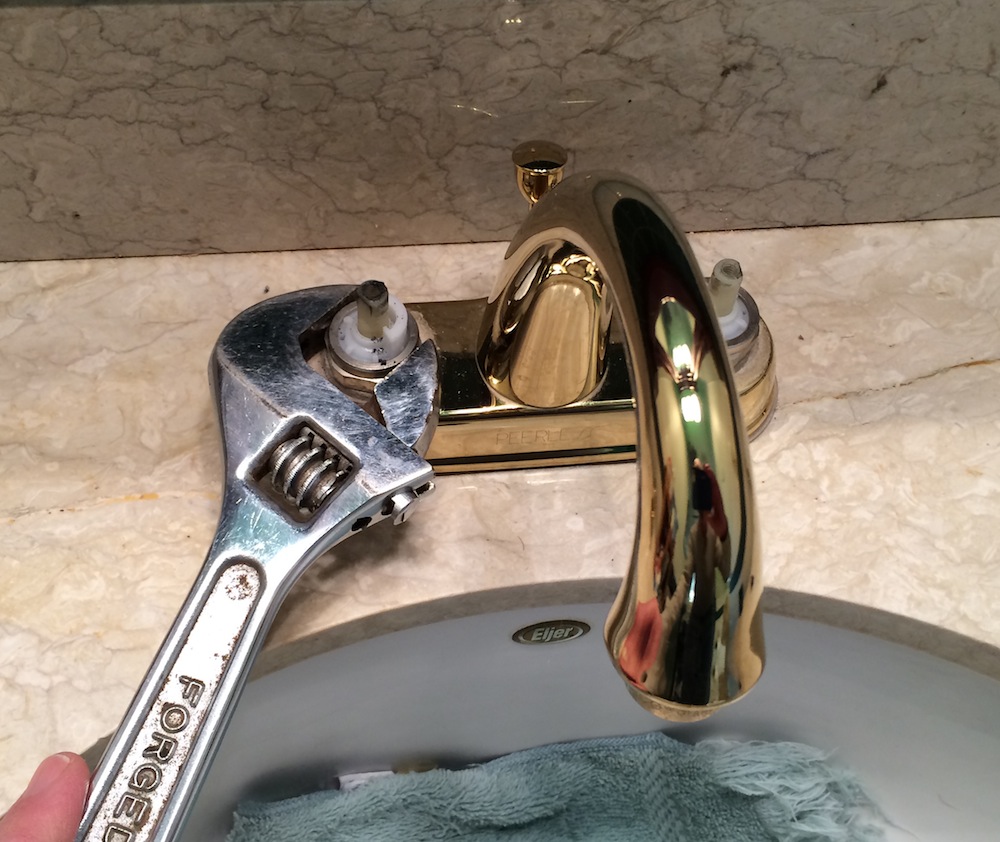What It's Necessary to Correct a Broken Faucet
What It's Necessary to Correct a Broken Faucet
Blog Article
The author is making a few great points about What Causes Leaky Faucets & How To Fix Them in general in the content in the next paragraphs.

Leaking taps may appear like a minor trouble, yet their influence goes beyond simply the inconvenience of the audio. From wasting water to sustaining unneeded economic prices and health and wellness threats, ignoring a dripping faucet can bring about various effects. In this post, we'll delve into why it's critical to address this common family problem promptly and properly.
Wastage of Water
Ecological Influence
Leaking faucets contribute dramatically to water wastefulness. According to the Environmental Protection Agency (EPA), a single tap trickling at one drip per second can lose greater than 3,000 gallons of water per year. This not only pressures water resources however also affects environments and wild animals depending on them.
Step-by-Step Guide to Fixing a Dripping Faucet
Tools Required
Before attempting to take care of a leaking faucet, gather the needed tools, including an adjustable wrench, screwdrivers, replacement parts (such as washing machines or cartridges), and plumber's tape.
Typical Tap Issues and Their Solutions
Recognize the kind of faucet and the specific concern causing the drip. Common troubles consist of worn-out washing machines, corroded shutoff seats, or defective O-rings. Refer to manufacturer instructions or on-line tutorials for detailed support on repair work.
Financial Costs
Raised Water Expenses
Beyond the environmental impact, leaking taps can blow up water expenses substantially. The accumulated wastefulness in time equates into greater utility expenditures, which might have been avoided with prompt repair services.
Prospective Residential Property Damage
Moreover, long term leaking can lead to harm to fixtures and surfaces bordering the faucet. Water accumulation can trigger discoloration, deterioration, and even architectural issues if left neglected, causing added repair costs.
Health Worries
Mold And Mildew and Mildew Growth
The constant existence of wetness from a leaking tap creates an excellent environment for mold and mildew and mold development. These fungis not just jeopardize interior air quality but also posture health and wellness dangers, especially for individuals with respiratory conditions or allergies.
Waterborne Illness
Stationary water in dripping faucets can become a breeding place for germs and other microorganisms, raising the risk of waterborne conditions. Impurities such as Legionella bacteria flourish in stationary water, potentially causing significant illnesses when ingested or inhaled.
DIY vs. Expert Fixing
Advantages and disadvantages of DIY Repair Service
While some might try to deal with a trickling faucet themselves, DIY repair work include their own set of difficulties. Without appropriate understanding and tools, DIY attempts can intensify the problem or result in incomplete repair services, prolonging the trouble.
Advantages of Working With a Specialist Plumber
Employing a specialist plumber makes certain that the underlying source of the trickling tap is resolved properly. Plumbing professionals have the experience and devices to identify and repair tap concerns effectively, saving time and reducing the risk of more damages.
Environmental Responsibility
Specific Payment to Conservation
Taking duty for taking care of leaking faucets straightens with more comprehensive initiatives toward water preservation and ecological sustainability. Every individual's actions jointly make a considerable impact on maintaining valuable sources.
Lasting Living Practices
By prioritizing punctual repair work and taking on water-saving routines, individuals add to sustainable living techniques that benefit both existing and future generations.
Preventive Measures
Normal Upkeep Tips
To prevent dripping taps, do routine upkeep such as cleaning up aerators, inspecting for leakages, and changing worn-out components immediately. Additionally, take into consideration mounting water-saving gadgets or upgrading to a lot more effective fixtures.
Value of Prompt Repairs
Resolving dripping faucets as quickly as they're noticed stops more water waste and possible damage, eventually saving both water and cash in the long run.
Effect On Home Worth
Assumption of Well-Maintained Home
Keeping a residential property in good condition, including dealing with maintenance problems like trickling faucets, enhances its perceived value and value amongst possible customers or tenants.
Influence on Resale Value
Features with well-maintained plumbing fixtures, including faucets, command higher resale values in the realty market. Dealing with leaking faucets can add to a favorable perception throughout building inspections and negotiations.
Conclusion
Dealing with a leaking faucet exceeds simple benefit; it's an essential step toward conserving water, reducing financial costs, and safeguarding health and residential or commercial property. Whether through DIY repairs or professional assistance, taking action to fix trickling faucets is a little yet impactful way to promote liable stewardship of sources and contribute to a healthier, more lasting future.
How to Fix a Leaky Faucet: Step-by-Step Repair Guide
A leaky faucet may seem like a simple annoyance, but if it's not fixed promptly, that leak could cost hundreds to potentially thousands. From water damage to mold, mildew, and high water bills, even a tiny leak can be catastrophic if left unattended. Damage like this can even affect the overall value of your home, so it's important to take the right approach for leaky faucet repair. You may need the help of a plumber in some cases, but we've got a few tips you can try on how to fix a leaky faucet before calling the pros.
Four Faucet Types
When you're learning how to fix a leaky faucet, the first step is knowing what kind of faucet you're working with! There are four common types.
Cartridge Faucets
Cartridge faucets come in one- or two-handled varieties. In one-handled cartridge faucets, hot and cold water combines in a single cartridge. In the two-handled versions, hot and cold water are controlled separately and mixed in the faucet.
Ball Faucets
Ball faucets have a single lever you push up and down to adjust the pressure and rotate to change the temperature. A slotted metal ball controls the amount of water allowed into the spout.
Compression Washer Faucets
They're the oldest type of faucet, but they're still used in many homes — especially older ones. Compression faucets have two separate handles that, when turned, raise or lower the washer that seals a water valve. This valve stops water from flowing through the faucet when it is turned off.
Disc Faucets
Disc faucets rarely need to be repaired due to their maintenance-free design. The water flow is controlled by two discs — the upper one raises and lowers against a fixed lower disc, creating a watertight seal. If your disc faucet starts leaking, you may need to replace the seals or clean residue buildup from the inlets.
Fixing a Leaky Faucet
Step 1: Turn Off the Water
Whether you're learning how to fix a leaky bathtub faucet or how to fix a leaky kitchen faucet, always turn off the water supply to your working area when you're fixing a leak. The last thing you want is a flood added to your list of things to fix.
Look for the shutoff valves below your sink or around the tub and turn them clockwise to stop the water flow. If your faucet doesn't have shutoff valves, you may need to turn off the water for the whole house. Check to make sure it's off by turning the faucet on. If nothing comes out, you're ready to start the repair.
Step 2: Take Apart the Faucet
How you disassemble your faucet depends on the type of fixture you have. You can use a flathead screwdriver to remove the caps on top of the handle or handles for cartridge and compression faucets. Inside, you should see handle screws. Unscrew these with a screwdriver to remove the handle.
Disc- and ball-style faucets will typically have an inlet screw near the handle, and removing that will reveal the interior of the faucet.
Detach the Valve Stem
For cartridge- and compression-style faucets, you'll see the inner valve stem or cartridge once you remove the faucet handles. If you have a compression faucet, unscrew the brass valve stem. If you have a cartridge faucet, pull out the cartridge. If your cartridge has been in place for a while, it may require some tools or extra force to remove it due to mineral deposits.
Examine and Replace Parts
Once you've removed the parts, check them out to confirm what needs to be replaced. You may see corroded rubber washers, O-rings, stems, or cartridges. On a ball-style faucet, check the seats and springs for damage.
If you need to repair a leaky disc faucet, check the inlet and seals on the lower disc.
Once you determine what parts must be replaced, visit your local hardware store. Bring the damaged parts with you to ensure you can purchase the correct components to replace them.
Clean Valves and Faucet Cavity
If you've removed a stem or cartridge, you may notice mineral buildup in the faucet's threads. Use white vinegar to clean the valve seat by soaking it for a few minutes, then scrub it away with a soft toothbrush and rinse with warm water. You can also clean the interior of the faucet in the same way.
Reassemble the Faucet
Once your faucet is cleaned and the required parts have been replaced, it's time to reassemble it. Put the pieces back together and slowly turn the water supply back on. Doing this slowly is crucial because too much initial water pressure can damage the new hardware you've just installed.
https://homewarranty.firstam.com/blog/how-to-fix-leaky-faucet

We hope you liked our post about What Causes Leaky Faucets & How To Fix Them. Thank you so much for taking a few minutes to read our blog. Are you aware of someone else who is interested in the niche? Please feel free to share it. I enjoy reading our article about Why Is It Important To Fix Your Leaking Tap/Faucet?.
Report this page